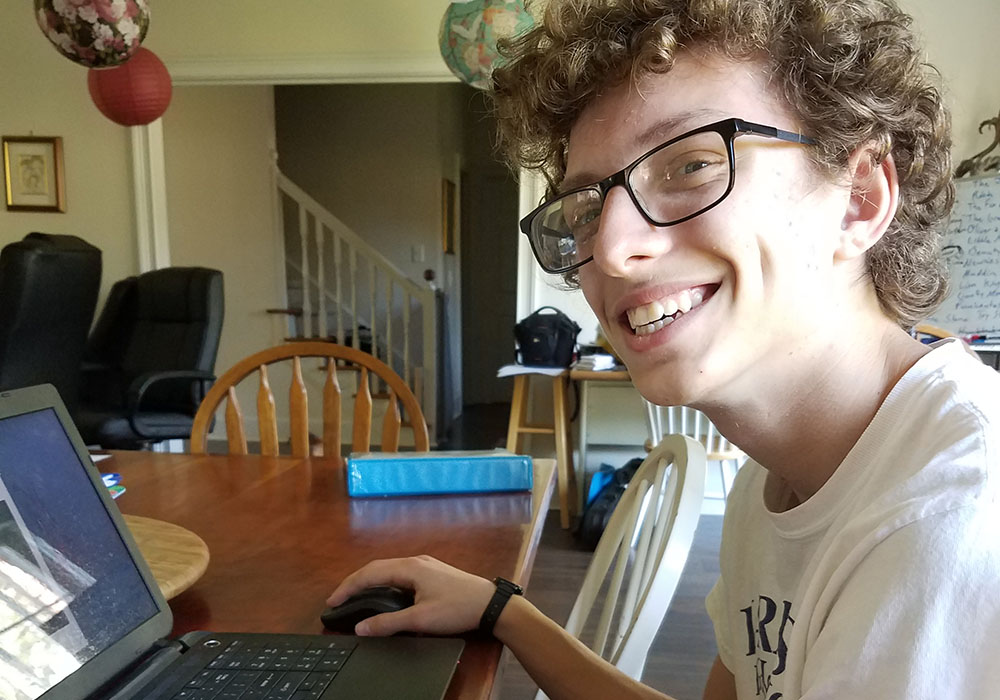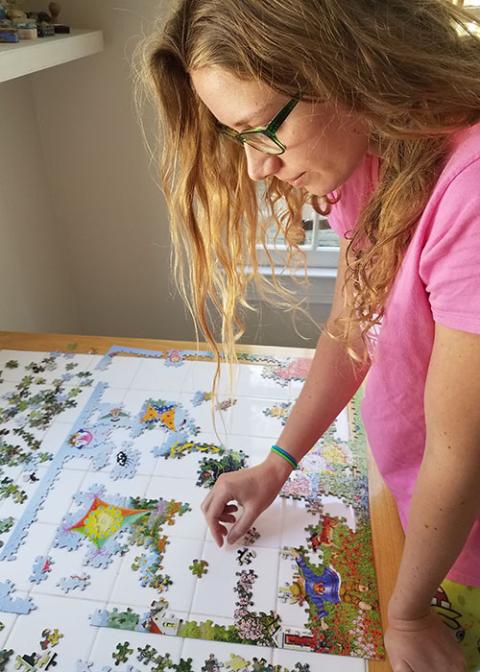
My brother Gianpaolo and I sit at a table together at home, to complete our work assignments. Because of COVID-19, I am currently working from my family home in Powder Springs, Georgia. (Maria Longo)
Editor's note: Notes from the Field includes reports from young people volunteering in ministries of Catholic sisters. A partnership with Catholic Volunteer Network, the project began in the summer of 2015. This is our 11th round of bloggers: Celine Reinoso is a Loretto Volunteer in El Paso, Texas, and Maria Longo is a Notre Dame AmeriCorps volunteer in the Bronx, New York.
Toward the end of January, the school I serve at in the Bronx held its first fine- and applied-arts showcase of the semester. Because February and Black History Month were just around the corner, the department decided to focus the children's talents on celebrating civil freedoms and African American culture.
I had taken huge spreads of black paper and drawn patterns and shapes on them with white pastel. The children in art class then colored the spaces with smears of yellow, gold, pink, green, orange, red and brown to create a backdrop for the stage.
The day of the performance came, and all the grades crammed into the Nest, our auditorium, to watch the show. All through the morning, one of my kindergarteners — we'll call her Kahyla — had been complaining of missing her mother. She kept coming to me, hugging my legs and clutching the back of my shirt with her head pressed against my side. I simply patted her head and took her hand when the time came to file downstairs for the show. We took our seats crisscross on the linoleum floor, and Kahyla leaned against me. After a brief introduction from the music teacher, Ms. Asibu, the showcase began with a song and dance number put on by the music students. It was an African song of welcome.
Fanga Alafia, ase, ase
Fanga Alafia, ase, ase
The more they sang, the more Kahyla pressed herself into me until she was lying on her side with her head on my knee.
With my eyes, I welcome you
With my words, I welcome you
With my heart, I welcome you
From there, the showcase worked its way through the poetry of Maya Angelou's "Still I Rise" and into a martial arts demonstration set to hip-hop. There was a presentation on Harriet Tubman accompanied by a dance about the Underground Railroad. That brought us into the soulful tune of Otis Redding's "Sittin' on the Dock of the Bay" and another dance performed by the second-graders.

I help my sister Elena on a puzzle when we have free time together, after working from home. (Maria Longo)
I ran my fingers methodically over Kahyla's braids, and I thought to myself how lucky I was to have such an opportunity. Because of so many courageous figures who spearheaded a fight for justice, I can sit beside a beautiful little African American girl, hug her when she cries and let her fall asleep and drool on my leg during a fine-arts showcase. I brushed the fuzzy bits of hair that had escaped the tight braids close to her scalp. She was sound asleep by the end of the first song, and when the show ended, I leaned over her and shook her gently, singing, "Kahyla. It's time to wake up, sweet girl."
She stirred and sat up groggily, drool glistening on her cheek.
I chuckled and used the inner lining of her sweater to wipe it away. She took my hand, and I took my position at the back of our class's line, making sure that no "kinder-baby" got left behind. These children are so dear to the hearts of our teachers, no matter what grade the faculty might teach, and I am so glad I have the chance to love on them.
In some instances, I might be the only consistency they have in their lives. With school closures and the continued spread of the coronavirus, it has become difficult to show that love and affection to the children in our care.
For some, it is safer to be in school than it is to be at home. Without the school meals, some have nothing to eat. The challenge lies open to me, my fellow missionaries and the school staff to support them however we can and to continuously search for new ways to connect with students.
For now, it seems machines and the virtual world are our only means of communication. That and prayer, of course. I have never been particularly tech savvy, but I have had some experience with spirituality.
We missionaries, like other faithful, are utilizing every outlet we can — phone calls, texts, FaceTime, YouTube, social media, etc. — to reach out into a reality we cannot experience firsthand. It almost seems as though our physical world, limited by the rules of time and space, has gained a certain level of abstraction. We no longer share the same air as the ones we are supposed to be teaching and loving and living life with. We are forced to serve without actually "serving." The corporal works of mercy have fallen beyond our grasp, and it doesn't seem they will be available again anytime soon.
Perhaps this is what the angels experience as our protectors and God's messengers. Our relationships have become broken and obstructed, but still they remain, the last few threads of a fine web that has been torn through. With everything up in the air, we have all the more reason to leave everything in the Lord's hands. Certainly, he will stitch us all back together in the end; of that, I have no doubt. In the meantime, it is up to us as Christians to perform our daily duties, reach out across worlds, and leap into the darkness with the zeal and faith of a child, trusting that when we fall, it will be into the arms of the Lord.
[Maria Longo serves with the Notre Dame AmeriCorps program in the Bronx, New York. Because of COVID-19, she is currently working from her family home in Powder Springs, Georgia.]
Advertisement







